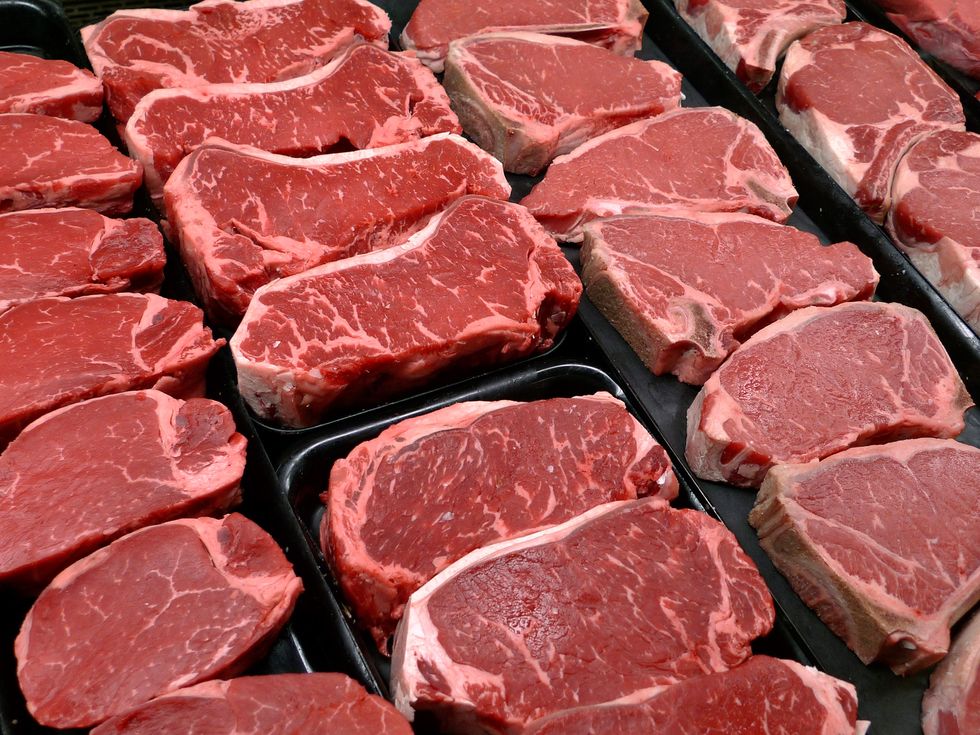Let me start out by saying, I am not a vegetarian.
I've tried to do it and failed, then decided I would just go pescatarian (only eating sea food) and that didn't work, so now I'm on the very-pretentious sounding food restriction of eating everything but mammals. I came to this because I realized if I wouldn't eat my dog, why would I eat a pig? Pigs are actually more intelligent than dogs, so it would be kind of hypocritical for me to stick my nose up at people in east asian countries who sometimes eat dog when I eat an animal even more emotionally adapted and intelligent.
So I write this article not to shame anyone (or myself) into being a vegetarian, but just to explore the question "do humans have a moral obligation to go vegetarian?"
In the Beginning...
Let's start with the history of humans consuming meat. Whether you are vegetarian or not, your basic biology was built on eating meat. Sorry, vegans! A 1.5 million year old skull of a child was found that is suspected died from a lack of B vitamins, those of which are found in meat. This suggests a human biological dependency on meat. Hunting animals in groups also created cooperation and improved human's social skills.
Modern Age: Humans Screw it up
However, now, due to domestication of animals and CAFOs, meat has become fattier and less nutritious. The international agency for research on cancer has even classified processed meats as a known carcinogen, and red meat as a probable carcinogen. Here's an excerpt from the article
"Twenty-two experts from 10 countries reviewed more than 800 studies to reach their conclusions. They found that eating 50 grams of processed meat every day increased the risk of colorectal cancer by 18%. That’s the equivalent of about 4 strips of bacon or 1 hot dog. For red meat, there was evidence of increased risk of colorectal, pancreatic, and prostate cancer."
We've even screwed up fish, one of the most nutritious sources of meat. The mercury problem with fish is entirely man made. The burning of fossil fuels releases mercury that was trapped in the ground into the air which goes into the ocean and flows through the food chain. Plus, unsafe tuna fishing practices can catch and kill dolphins on accident, an animal that at least in western cultures, is taboo to kill or eat.
People that have called it quits on meat are doing just fine!
Additionally, people who eat less meat and more vegetables even tend to live longer than people who eat a lot of it.
It is true that people who don't eat meat have higher risks of anemia and b-12 deficiency, but there are ways to combat that with supplements and wisely chosen foods. Leafy greens often have high levels of iron and soy products are often fortified with b-12 to make up for the lack of b-12 caused by not eating meat.
Morals
Aside from personal health risk, eating meat can do a lot of damage. Cows produce enormous amounts of methane, a greenhouse gas that accounts for 25% of manmade global warming, something that effects all of us. There are ways to actually utilize this methane, so it at least goes to something before being released into the atmosphere, but its pretty inconvenient, involving hooking up the cow's stomach to a giant plastic bag, and the methane ends up in the atmosphere in the end anyway, a greenhouse gas 84 times more potent than carbon dioxide.
But let's say you think global warming is a myth perpetrated by the Chinese, even so the production of livestock (CAFOs and all the fields needed to grow crops to feed them) destroy enormous areas of natural habitats. Cattle production was the #1 cause of deforestation in the Amazon rain forest from 2000-2005. Deforestation is the #1 cause of species extinction, far ahead of climate change.
Finally, we have more knowledge of animals' personalities, thoughts, friendships, and experiences than ever before. We know animals feel pain, fear, have emotions, and can even have best friends. How is it okay for us to kill them for their meat, something we can live perfectly healthy lives without?
Do humans have a moral obligation to go vegetarian?
Based on the harm that meat production does on the ecosystem, the atmosphere, the animals, and our own bodies, I'd say yes, we do have a moral obligation to go vegetarian. Now let me be clear, this only applies to people in first world countries that can easily get access to healthy meat alternatives and necessary supplements at a reasonable price. In some impoverished areas where meat is necessary for survival or the only affordable thing available to eat (like in food deserts), I believe its completely morally permissible for them to eat meat, because as much as I love animals, I still consider human lives to be more important than other animals, if a human has to choose between hunting and eating a rabbit or dying of starvation, by all means they should hunt and eat the rabbit.
Personally, will I stop eating meat? Probably not, at least for a while. The reason for that is selfish: I really like chicken. Especially in America, a big part of our childhood revolves around meat. Chicken nuggets and chicken patties for school lunch, fish sticks, grilling hamburgers outside with dad, eating ham with the family on easter and turkey on thanksgiving, we all have delicious, happy memories associated with the consumption of meat, and I don't suspect any of that to change any time soon. It's embedded in our culture.
Whether you're a hard core carnivore or not, meat consumption is something to think about. If not going totally vegetarian, then at least reducing consumption. Really weigh the benefits and drawbacks.






 The minimum wage is not a living wage.
StableDiffusion
The minimum wage is not a living wage.
StableDiffusion
 influential nations
StableDiffusion
influential nations
StableDiffusion












